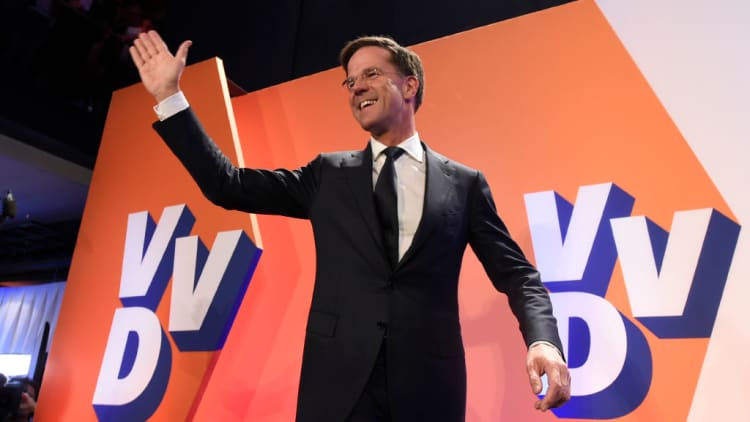
The Dutch establishment held strong under a growing wave of populism as center-right Prime Minister Mark Rutte looks on course for victory following the country's biggest election in a generation.
Dutch voters turned out en masse Wednesday to elect their new government following a tumultuous campaign in which anti-Islam and anti-EU Geert Wilders' Freedom Party appeared to make significant gains, prompting concerns over a continued rise of populist sentiment across Europe.
However, current indicators suggest that incumbent Rutte's party will secure the biggest share of the vote and sit at the helm of the country's new government.
"It appears that the VVD will be the biggest party in the Netherlands for the third time in a row," a beaming Rutte told cheering supporters at a postelection party in The Hague. "Tonight we'll celebrate a little."
At current count, Rutte's VVD party will take 33 of the 150 available parliamentary seats. Wilders' PVV is set for 20 seats, the Christian Democratic Appeal and the centrist Democrats 66 look on track to secure 19, while the Socialist Party is expected to take 14. The Labour Party appears to have suffered significant loses since joining a coalition with the VVD in the last election, and is likely to secure nine seats.
The Dutch parliament requires a majority of 76 seats to form a government, so Rutte will need to strike a coalition deal with at least three other parties. Given that he has ruled out working with Wilders, it is likely that this could include the CDA and the D66 and one or more smaller parties.
The Dutch Green Party could be one among these, having seen significant gains Wednesday and securing 14 seats. However, leader Jesse Klaver told CNBC: "I don't want to go into government with the VVD," adding that he blamed Rutte's government for the rise of Wilders.
Despite coming in second place, Wilders is unlikely to hold any sway in the future government due to the fragmented parliamentary system. He lost momentum in recent days as Rutte made gains after drawing a hard line on foreign pressures from the Turkish government.
Nevertheless, Wednesday's result sees Wilders' party shift up from third place in the previous election. Wilders heralded the result a major gain for the party, tweeting "We won seats. The first gains are made."
"Rutte has not seen the back of me!!"
A risky coalition
The most significant loss in Wednesday's election, however, is likely to be for the Labour party, VVD's former coalition ally.
As the junior party in the coalition, the Labour party had to accede to a number of austerity measures, which saw it lose much of its popularity while in power. The party went from securing 38 seats in 2012 to just nine.
"In the Netherlands - particularly over the last 15 years - governing means losing votes," explained Hans Vollaard, professor at Leiden University.
As leading parties enter discussions to form a new government over the coming weeks and months, Vollaard warned potential bedfellows of the VVD to beware of what this could mean for the political futures of their respective parties.
"The most important message for governing parties is; include at least one of your main competitors in government," he said, suggesting that the Christian Democrats might be the VVD's next target.
"For the fiscal conservative VVD Party, led by the incumbent Prime Minister Mark Rutte, it means at least get the Christian Democrats into government and for the D66 Party it will mean that they should get the GreenLeft party in it."
A landmark vote
The result was a significant one for Dutch democracy: 82 percent of the electorate turned out to the polls on Wednesday, the highest number in 30 years.
The outcome was also seen as a win for opinions polls, whose reputations had taken a battering in recent months following their drastic failure to predict Donald Trump's election and the Brexit vote last year. While not precisely accurate, the most recent polls did predict a win for Rutte and second place for Wilders.
Europe reacts
Wednesday's election was seen by Europe watchers as a litmus test for other upcoming elections across the continent, specifically in France and Germany.
Politicians from both countries were quick to congratulate the Netherlands for staving off populist policies that overturned the U.S. election and the U.K.'s EU referendum.
"Congratulations to the Dutch for stemming the rise of the far right," France Foreign Minister Jean-Marc Ayrault wrote on Twitter. "Desire to work for a stronger Europe."
The head of German Chancellor Angela Merkel's office, Peter Altmaier, described the exit poll result as "terrific".
"Netherlands oh Netherlands you are a champion," he tweeted. "Congratulations on this terrific result."


